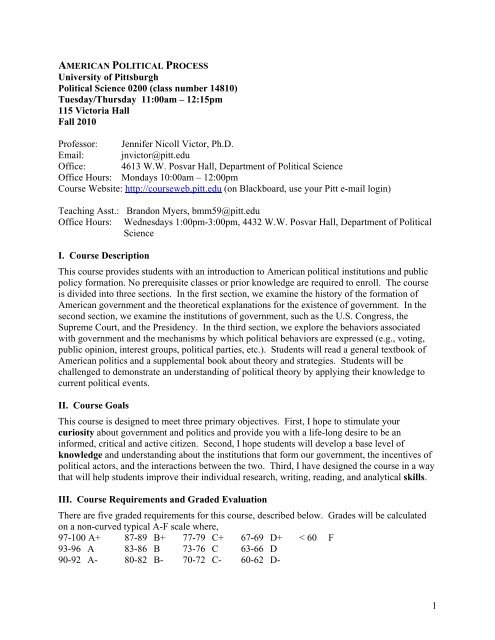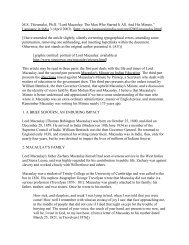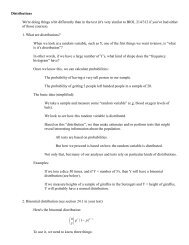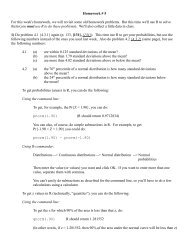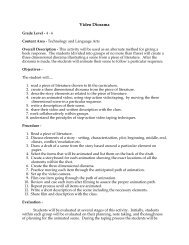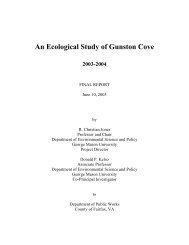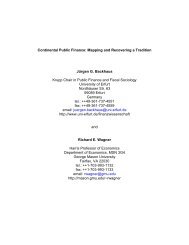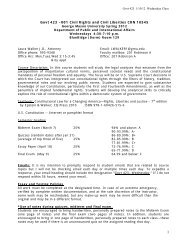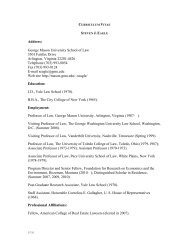Syllabus - Mason academic research system (mason.gmu.edu)
Syllabus - Mason academic research system (mason.gmu.edu)
Syllabus - Mason academic research system (mason.gmu.edu)
Create successful ePaper yourself
Turn your PDF publications into a flip-book with our unique Google optimized e-Paper software.
AMERICAN POLITICAL PROCESS<br />
University of Pittsburgh<br />
Political Science 0200 (class number 14810)<br />
Tuesday/Thursday 11:00am – 12:15pm<br />
115 Victoria Hall<br />
Fall 2010<br />
Professor: Jennifer Nicoll Victor, Ph.D.<br />
Email: jnvictor@pitt.<strong>edu</strong><br />
Office: 4613 W.W. Posvar Hall, Department of Political Science<br />
Office Hours: Mondays 10:00am – 12:00pm<br />
Course Website: http://courseweb.pitt.<strong>edu</strong> (on Blackboard, use your Pitt e-mail login)<br />
Teaching Asst.: Brandon Myers, bmm59@pitt.<strong>edu</strong><br />
Office Hours: Wednesdays 1:00pm-3:00pm, 4432 W.W. Posvar Hall, Department of Political<br />
Science<br />
I. Course Description<br />
This course provides students with an introduction to American political institutions and public<br />
policy formation. No prerequisite classes or prior knowledge are required to enroll. The course<br />
is divided into three sections. In the first section, we examine the history of the formation of<br />
American government and the theoretical explanations for the existence of government. In the<br />
second section, we examine the institutions of government, such as the U.S. Congress, the<br />
Supreme Court, and the Presidency. In the third section, we explore the behaviors associated<br />
with government and the mechanisms by which political behaviors are expressed (e.g., voting,<br />
public opinion, interest groups, political parties, etc.). Students will read a general textbook of<br />
American politics and a supplemental book about theory and strategies. Students will be<br />
challenged to demonstrate an understanding of political theory by applying their knowledge to<br />
current political events.<br />
II. Course Goals<br />
This course is designed to meet three primary objectives. First, I hope to stimulate your<br />
curiosity about government and politics and provide you with a life-long desire to be an<br />
informed, critical and active citizen. Second, I hope students will develop a base level of<br />
knowledge and understanding about the institutions that form our government, the incentives of<br />
political actors, and the interactions between the two. Third, I have designed the course in a way<br />
that will help students improve their individual <strong>research</strong>, writing, reading, and analytical skills.<br />
III. Course Requirements and Graded Evaluation<br />
There are five graded requirements for this course, described below. Grades will be calculated<br />
on a non-curved typical A-F scale where,<br />
97-100 A+<br />
93-96 A<br />
90-92 A-<br />
87-89 B+<br />
83-86 B<br />
80-82 B-<br />
77-79 C+<br />
73-76 C<br />
70-72 C-<br />
67-69 D+<br />
63-66 D<br />
60-62 D-<br />
< 60 F<br />
1
Short Essays (30%) Students will write 2 or 3 essays of 300-600 words each on a topic of their<br />
choosing. Students may write up to three papers, but only the papers with the two highest scores<br />
will be included in the calculation for students’ final grades (each paper will therefore make-up<br />
15% of the final grade). The papers are due on the following dates: Thursday, October 7;<br />
Tuesday, November 9; Thursday, December 2. In each essay, students will find a current<br />
event that describes the existence of a public good that has resulted in a collective action<br />
problem. Students’ essays will (a) identify the public good, (b) describe how the public good<br />
results in a collective action problem (c) identify a government institution that has been<br />
developed to solve the problem, and (d) evaluate whether or not the government institution<br />
successfully provides the public good. Arguments should have 2 to 4 premises and a clear<br />
conclusion. To the extent that students use <strong>research</strong> to back their claims, they must create a<br />
bibliography formatted in APSA style (see handout and resources on Blackboard).<br />
Midterm Exam (30%) This will be an in-class exam covering material from the first portion of<br />
the course. The exam will include multiple choice and short answer questions (closed book,<br />
closed-note) based on material presented in class and in the readings. The exam will be in-class<br />
on Thursday, October 28. This is the ONLY day to take the exam. If you do not come to class<br />
on this day or you arrive after the first person to complete the exam has finished, you will not be<br />
allowed to take the exam.<br />
Final Exam (40%) This will be an in-class exam covering material from the entire course<br />
(comprehensive), though concentrating on material from the last half of the course (Institutions).<br />
The exam will include multiple choice and short answer questions (closed book, closed-note)<br />
based on material presented in class and in the readings. The exam will be in-class on Saturday,<br />
December 18 at 12:00pm – 1:50pm. This time has been designated by the University and<br />
cannot be changed; it is the ONLY date and time to take the exam. If you do not come to class<br />
on this day or you arrive after the first person to complete the exam has finished, you will not be<br />
allowed to take the exam.<br />
IV. Missing and Late Work<br />
If you are aware that you will miss an exam or assignment due date you must notify the<br />
instructor at least two days prior to the due date or exam date. Make-up exams are conducted at<br />
the instructor’s discretion and are granted only in extraordinary circumstances. Make-up exams<br />
will be closed-book essay exams. Late assignments will have scores r<strong>edu</strong>ced by 5 percent for<br />
each day the assignment is late. I will waive the score r<strong>edu</strong>ction for a verified illness (bring a<br />
doctor’s note) or a verified family emergency (you must provide documentation).<br />
V. Following Political Developments in the Media<br />
Students are encouraged to follow current political events. A familiarity with current happenings<br />
around you will facilitate your ability to understand the material. Along with any local papers<br />
you may read, I recommend that you read The New York Times, The Wall Street Journal or The<br />
Washington Post with frequency. You can sign up to receive daily e-mail news updates from the<br />
New York Times or The Washington Post on their websites. Additionally, you may want to<br />
examine news-magazines for more in-depth coverage of particular issues and events.<br />
Congressional Quarterly Weekly Report and National Journal are two particularly informative<br />
periodicals. Other options include Time, Newsweek, or The Economist. You can also subscribe<br />
2
to podcasts where you can listen to headlines from these news sources. Finally, I strongly<br />
encourage students to listen to NPR at 90.5 (WDUQ), where “Morning Edition” (5am-9am) and<br />
“All Things Considered” (4pm-6pm) provide excellent current events information.<br />
Professor Victor’s Top 5 News Websites<br />
Name URL Description<br />
New York Times http://www.nytimes.com General national news and current<br />
events.<br />
Washington Post http://www.washingtonpost.com General national news, with a<br />
concentration on events in<br />
Washington, D.C.<br />
CNN http://www.cnn.com General national news<br />
Congressional Quarterly<br />
Politics<br />
http://www.cqpolitics.com<br />
News about Congress, events on<br />
Capitol Hill, and government.<br />
National Journal http://www.nationaljournal.com News about Congress, elections,<br />
and important people in<br />
government.<br />
VI. Student Responsibilities<br />
A. Class Attendance and Participation. Learning is an active, rather than passive, exercise.<br />
Accordingly, every student is expected to attend class as well as be prepared to ask questions<br />
about and comment on the readings. You need to complete the daily reading assignment prior to<br />
the class meeting. You will be much more successful in this class if you attend regularly, take<br />
notes, pay attention, and participate.<br />
B. Readings. As is the case with attendance, keeping pace with the reading is essential to<br />
succeeding in this class. It is your responsibility to obtain copies of the readings prior to the date<br />
we will discuss them in class. I will do everything I can to make this task easier for you. You<br />
will be much more successful in this course if you complete the assigned readings and take notes<br />
on them.<br />
C. Cheating, Plagiarism, and Academic Integrity. Students in this course will be expected<br />
to comply with the University of Pittsburgh's Policy on Academic Integrity (available at:<br />
http://www.pitt.<strong>edu</strong>/~provost/ai1.html). Any student engaged in any <strong>academic</strong> misconduct will<br />
receive an F on the offending exam or assignment. Egregious violations will result in an F grade<br />
for the course and will be reported to the appropriate Dean’s office. These violations include<br />
cheating on an exam, using someone else’s work as your own, and plagiarizing the written word.<br />
Plagiarism (using someone else’s words or ideas without providing credit or citation) is a serious<br />
offense. If you have any questions at all about what constitutes cheating, plagiarism, or<br />
<strong>academic</strong> misconduct, please ask the instructor.<br />
D. Students with Disabilities. If you have a disability for which your are or may be<br />
requesting an accommodation, you are encouraged to contact both your instructor and Disability<br />
3
Resources and Services, 140 William Pitt Union (412) 648-7890/(412) 383-7355 (TTY), as early<br />
as possible in the term. DRS will verify your disability and determine reasonable<br />
accommodations for this course. All discussions with me regarding disabilities are confidential.<br />
VII. Teaching Strategy<br />
While lectures are important because they help to distribute necessary information and facts, they<br />
are not usually the most effective way to learn information. For this reason, we will do a variety<br />
of activities in the classroom. Students will be expected to participate in class discussions and<br />
work together in critical thinking groups. We may watch a film and engage in interactive<br />
activities in the classroom. I hope that the variety of <strong>edu</strong>cational stimuli will help students to<br />
absorb more information. However, a certain amount of lecturing is necessary.<br />
VIII. Reading Assignments<br />
The reading assignments are chosen to buttress and expand on the analytic foundation laid in<br />
class. Please notify the instructor about problems obtaining the readings as soon as<br />
possible. The following materials are required and can be found at the campus Book Center.<br />
You are strongly encouraged to obtain copies of these texts and read them; doing so is critical to<br />
success in this course. There are two required books for this course:<br />
Bianco, William T. 2001. American Politics: Strategy and Choice. New York: W.W. Norton<br />
& Co.<br />
ISBN 978-0-393-97610-6<br />
Lowi, Theodore J, Benjamin Ginsberg, Kenneth A. Shepsle, Stephen Ansolabehere. 2010.<br />
American Government: Power and Purpose, FULL 11 th ed. (with policy chapters). New<br />
York: W.W. Norton & Company.<br />
New Hardcover: ISBN 978-0-393-93298-0 ($97.50)<br />
*BOOK DISCOUNTS: The University Book Center carries the required titles for this course.<br />
The publisher offers a special package discount for buying both titles together (hardcover<br />
$88.00 ISBN 978-0-393-14317-1). In addition, the publisher offers the main text (Lowi,<br />
et al.) for a 50% discount if it is purchased as an E-book: ISBN 978-0-393-11717-2<br />
($48.75). If you choose to purchase your books elsewhere, you may do so; however, you<br />
are responsible for reading the required assignments prior to arriving in class each week.<br />
If you order your books on-line from another source and it takes several weeks to get<br />
here, you are still responsible for the readings while you wait for your text.<br />
IX. Course Sch<strong>edu</strong>le and Reading Assignments<br />
Tues., Aug. 31 Introduction to the Course (1)<br />
RULES OF THE GAME: THE FOUNDATIONS OF AMERICAN GOVERNMENT<br />
Thurs., Sept. 2<br />
Readings:<br />
Why Government? (2)<br />
Lowi, et al., Chapter 1 (“The Five Principles of Politics”)<br />
Bianco, Chapter 1 (pp. 3-15)<br />
4
Concentration<br />
Questions:<br />
Define government and politics.<br />
What are the two elements of every government?<br />
What are the three primary purposes of government?<br />
What is a collective action problem?<br />
Tues., Sept. 7<br />
Readings:<br />
Concentration<br />
Questions:<br />
The Constitution (3)<br />
Lowi, et al., Chapter 2 (“Constructing a Government”)<br />
Lowi, et al., The Constitution of the United States of America (see<br />
Appendix)<br />
What was America’s first constitution called?<br />
Why did the Articles of Confederation fail?<br />
What were some of the compromises reached in the drafting of the<br />
Constitution?<br />
How was the Constitution the solution to a collective action<br />
problem?<br />
Thurs., Sept. 9 &<br />
Tues., Sept. 14<br />
Readings:<br />
Concentration<br />
Questions:<br />
Pluralism, Preference Aggregation, and Majority Rule Cycling (4&5)<br />
Lowi, et al., Federalist No. 10 (see Appendix)<br />
Lowi, et al., Federalist No. 51 (see Appendix)<br />
Bianco, Chapter 2 (pp. 16-35)<br />
In Federalist No. 10, what is Madison worried about?<br />
Are Madison’s suggestions for quelling the violence of factions<br />
reasonable? Why or Why not?<br />
How does Madison think we should control the effects of factions?<br />
In Federalist No. 51, why does Madison think that government<br />
responsibilities should be divided?<br />
What “evil” is Madison worried about? Why?<br />
How does Madison think we can prevent tyranny of the majority?<br />
Thurs., Sept. 16<br />
Readings:<br />
Concentration<br />
Questions:<br />
Federalism and Prisoners’ Dilemmas (6)<br />
Lowi, et al., Chapter 3 (“The Constitutional Framework: Federalism<br />
and the Separation of Powers”)<br />
Bianco, Chapter 3 (pp. 36-66)<br />
What is federalism?<br />
What were the circumstances in McCulloch v. Maryland?<br />
Name some national, state and concurrent powers.<br />
How can you find an equilibrium in a prisoners’ dilemma?<br />
How is a prisoners’ dilemma a collective action problem?<br />
What are some solutions to a collective action problem?<br />
5
Tues., Sept. 21<br />
Readings:<br />
Concentration<br />
Questions:<br />
Civil Liberties (7)<br />
Lowi, et al., Chapter 4 (pp. 118-133) (“The Constitutional<br />
Framework: Civil Liberties and Civil Rights”)<br />
What is the difference between civil rights and civil liberties?<br />
What liberties does each Amendment in the Bill of Rights protect?<br />
What legal test must the government satisfy to legally restrict<br />
speech?<br />
What legal standard is used to determine whether government has<br />
violated the religious establishment clause?<br />
Can you recite the First Amendment?<br />
Thurs., Sept. 23<br />
Readings:<br />
Concentration<br />
Questions:<br />
Tues., Sept. 28<br />
Civil Rights (8)<br />
Lowi, et al., Chapter 4 (pp. 133-157) (“The Constitutional<br />
Framework: Civil Liberties and Civil Rights”)<br />
Where in the Constitution does one find their right to “equal<br />
protection” under the law?<br />
What were the Civil War Amendments?<br />
What is the significance of Plessy v. Ferguson and Brown v. Board of<br />
Eduction?<br />
Is affirmative action legal? What type?<br />
What guarantees women a legal right to vote? When was this<br />
guarantee made?<br />
Which classes of Americans still experience illegal discrimination?<br />
And legal discrimination?<br />
Special presentation and instructions on writing <strong>research</strong> papers in<br />
political science.<br />
INSTITUTIONS: RULES, POLITICIANS, AND GOVERNMENT<br />
Thurs., Sept. 30 &<br />
Tues., Oct. 5<br />
Readings:<br />
Concentration<br />
Questions:<br />
Congress (9 &10)<br />
Lowi, et al., Chapter 5 (“Congress”)<br />
Bianco, Chapter 6 (pp. 121-146) (review pp. 30-33)<br />
Writing Assignment #1 Due Thurs., Oct. 7<br />
What are the steps in the lawmaking process?<br />
Where does one find the Rules Committee and what does it do?<br />
What are some major differences between the House and Senate?<br />
What is a filibuster?<br />
What is a logroll? What is a Gerrymander?<br />
6
Thurs., Oct. 7<br />
Readings:<br />
Concentration<br />
Questions:<br />
The Presidency (11)<br />
Lowi, et al., Chapter 6 (“The Presidency as an Institution”)<br />
What is the difference between being a head of state and a head of<br />
government?<br />
Under what conditions can the President claim “executive<br />
privilege?”<br />
What is an “executive order”? A “signing statement”? An<br />
“executive agreement?”<br />
Does the President make the federal budget?<br />
Can the President take the country to war?<br />
Thurs., Oct. 14<br />
(Note: Mon., Oct. 11 is<br />
Fall Break. Monday<br />
classes meet on Tuesday<br />
Oct. 12 and our class will<br />
not meet on Tuesday of<br />
this week).<br />
Readings:<br />
Concentration<br />
Questions:<br />
The Bureaucracy (12)<br />
Lowi, et al., Chapter 7 (“The Executive Branch”)<br />
Bianco, Chapter 7 (pp. 147-173)<br />
How many cabinet secretaries are there?<br />
In which Department can one find the National Park Service? The<br />
Forestry Service?<br />
What is the OMB?<br />
What is a government corporation? What is an example of one?<br />
By what means does Congress oversee the bureaucracy?<br />
Who is the Secretary of Defense?<br />
Tues., Oct. 19<br />
Thurs., Oct. 21<br />
Readings:<br />
Concentration<br />
Questions:<br />
The Judiciary (13 & 14)<br />
Lowi, et al., Chapter 8 (“The Federal Courts”)<br />
Bianco, Chapter 8 (pp. 174-189)<br />
What is the significance of Marbury v. Madison?<br />
What Act of Congress created the federal judiciary <strong>system</strong>?<br />
What are the rules of access a case must satisfy before the<br />
Supreme Court will hear it?<br />
What is the “rule of four?”<br />
What is the majority opinion?<br />
By what means do interest groups attempt to influence the Court?<br />
Who are the current justices serving on the Supreme Court?<br />
Tues., Oct. 26<br />
MIDTERM EXAM<br />
PEOPLE AND POLITICS: VOTING, PARTICIPATION, AND GOVERNMENT<br />
7
Thurs., Oct. 28 &<br />
Tues., Nov. 2<br />
Readings:<br />
Concentration<br />
Questions:<br />
Public Opinion (15 & 16)<br />
Lowi, et al., Chapter 9 (“Public Opinion”)<br />
In polling, how can one obtain a representative sample?<br />
What is measurement error?<br />
What are some common beliefs among liberals? Conservatives?<br />
What is an attitude and where does it come from?<br />
What is political socialization?<br />
Do individuals tend to have consistent and stable opinions? If not,<br />
how can we measure public opinion?<br />
What types of issues do Americans tend to agree on?<br />
Thurs., Nov. 4 &<br />
Tues., Nov. 9<br />
Readings:<br />
Concentration<br />
Questions:<br />
Elections, Voting and Campaigning (17 & 18)<br />
Lowi, et al., Chapter 10 (“Elections”)<br />
Bianco, Chapter 4 (pp. 67-90)<br />
Writing Assignment #2 Due Tues., Nov. 9<br />
When were African Americans guaranteed suffrage?<br />
What guaranteed 18-year-olds the right to vote?<br />
Is it rational to vote? What is the “paradox of voting?”<br />
How do citizens overcome the adverse selection problem?<br />
What type of people are more likely to vote?<br />
Has turnout decreased or increased in recent years? Why?<br />
What is “rational ignorance?”<br />
What is FECA? BRCA?<br />
How much money can an individual legally give to a candidate for<br />
office?<br />
Thurs., Nov. 11 &<br />
Tues., Nov. 16<br />
Readings:<br />
Concentration<br />
Questions:<br />
Political Parties (19 & 20)<br />
Lowi, et al., Chapter 11 (“Political Parties”)<br />
Bianco, Chapter 5 (pp. 91-120)<br />
What is Duverger’s Law?<br />
What are the five party <strong>system</strong>s? Which parties and features<br />
characterize each <strong>system</strong>?<br />
Which coalitions of voters do the modern Republican and<br />
Democratic parties include?<br />
What is the median voter theorem?<br />
Thurs., Nov. 18 &<br />
Tues., Nov. 23<br />
Readings:<br />
Interest Groups (21 & 22)<br />
Lowi, et al., Chapter 12 (“Groups and Interests”)<br />
8
Concentration<br />
Questions:<br />
Review Bianco, Chapter 3 (pp. 36-66)<br />
Do interest groups tend to serve an inherently positive or negative<br />
role in American politics?<br />
Which characteristics describe groups that desire public goods?<br />
And private goods?<br />
How do groups overcome the collective action problem?<br />
What is a PAC? Which characteristics describe most PACs?<br />
Thurs., Nov. 25<br />
Tues., Nov. 30<br />
Readings:<br />
Concentration<br />
Questions:<br />
Thanksgiving Recess. No Class.<br />
Media and Politics (23)<br />
Lowi, et al., Chapter 13 (“The Media”)<br />
Which major events and technological advances significantly<br />
changed the way Americans learn about the nation/world in the<br />
20 th century?<br />
How can a consumer determine whether the news source to which<br />
they are paying attention is a reliable one?<br />
What is the best way to become/remain and informed citizen?<br />
What makes a good campaign advertisement?<br />
Thurs., Dec. 2<br />
Readings:<br />
Concentration<br />
Questions:<br />
Public Policy: Economic Policy (24)<br />
Lowi, et al., Chapter 14 (“Government in Action: Public Policy<br />
and the Economy”)<br />
Writing Assignment #3 Due Thurs., Dec. 2<br />
What is laissez-faire economics?<br />
Under what conditions does government regulate?<br />
Which characteristics describe an inefficient or failed market?<br />
What is the difference between fiscal and monetary policy?<br />
What tools does government have to stimulate a slowed economy?<br />
What is the “Fed” and what does it do?<br />
Tues., Dec. 7<br />
Readings:<br />
Concentration<br />
Questions:<br />
Thurs., Dec. 9<br />
Readings:<br />
Concentration<br />
Public Policy: Social Policy (25)<br />
Lowi, et al., Chapter 15 (“Government and Society”)<br />
What trends describe poverty in America?<br />
What is TANF? EITC?<br />
How is Social Security funded?<br />
What is the difference between Medicare and Medicaid?<br />
Public Policy: Foreign Policy (26)<br />
Lowi, et al., Chapter 16 (“Foreign Policy and Democracy”)<br />
What started/ended the Cold War?<br />
9
Questions:<br />
Saturday, Dec. 18<br />
What is the “Bush Doctrine?”<br />
What are the arguments for and against the claim that going to<br />
war in Iraq made the U.S. safer?<br />
What is the IMF? World Bank? United Nations?<br />
FINAL EXAM 12:00pm – 1:50pm<br />
10


